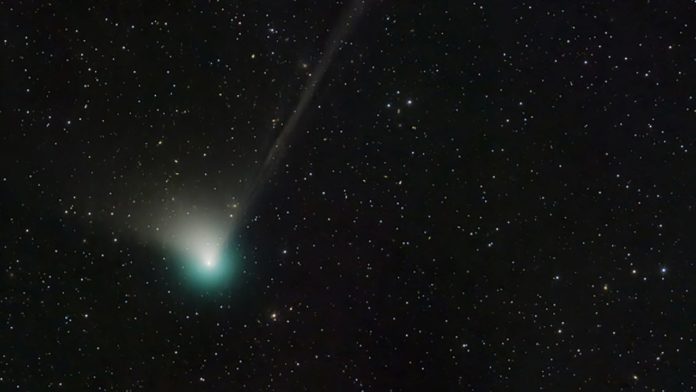Get prepared, Vancouver Island!
A rare green comet that has not been seen in 50,000 years could be visible from Earth throughout the month of January, with the peak viewing occurring near the end of the month.
This is thanks to a newfound comet— scientifically named C/2022 E3 (ZTF)— that is passing by Earth, and it could become bright enough to be seen by the naked eye.
Award-winning astronomer, Dr.Karun Thanjavur tells Victoria Buzz this comet is unique, not only because it is large enough to be seen with the naked eye, but also because it might be the last time we ever experience it.
“10 or 15 thousand years ago it passed by the sun. There is speculation this might be the last passage as its orbit has changed, leaving it unbound. As it passes the sun it will then leave the solar system altogether,” said Thanjavur.
Initially identified as an asteroid on March 2nd, 2022, astronomers Frank Masci and Bryce Bolin first discovered the unidentified comet at the Palomar Observatory in Southern California.
NASA says the comet is expected to make its closest approach to the sun on January 12th and will be visible to stargazers in the Northern Hemisphere.
The comet is expected to shift northwest on the horizon throughout January, making its closest pass of Earth from February 1st to February 2nd.
During that time, the comet will be 26 million miles away from Earth, according to astronomers.
For those looking to the night sky this month, Dr. Thanjavur says Victorians should mark the evening of January 26th and 27th in their calendars.
“Right now it is visible in the Northeastern sky in the early hours of the morning. As the month progresses it is going to traverse across the sky, westward, making it higher and higher in the sky. By the 26th and 27th of January, it’s going to be at its brightest.”
For those searching for the comet without a telescope, Dr. Thanjavur says the late night display is currently on the fringes of what the human eye can see.
“In Victoria, city lights are getting quite bright so the one place that I would recommend is Cattle Point which has been declared as a dark sky reserve. If people don’t mind a bit of a drive up the peninsula towards Sidney, Island View Beach would be good as well,” Dr.Thanjavur tells Victoria Buzz.
As many skywatchers will look to the stars over the next couple of weeks in search of comet C/2022, several factors will impact visibility such as weather and light pollution.
For those keen on viewing the comet’s trajectory from home, the Virtual Telescope Project is hosting a live stream for stargazers.
While the comet is sure to turn a few heads, phenomenons like these excite astronomers like Dr. Thanjavur when it comes to educational opportunities for the public.
As a senior astronomy lab instructor at the University of Victoria, Dr. Thanjavur says events of this nature give people the chance to come together and learn about science.
“Looking up at the sky gives an opportunity for people to talk about space and other science related topics. To me, that’s what makes it even more interesting. People get together with their families and look up at the sky, talk about this object, and explore science education,” says Dr. Thanjuvar.


